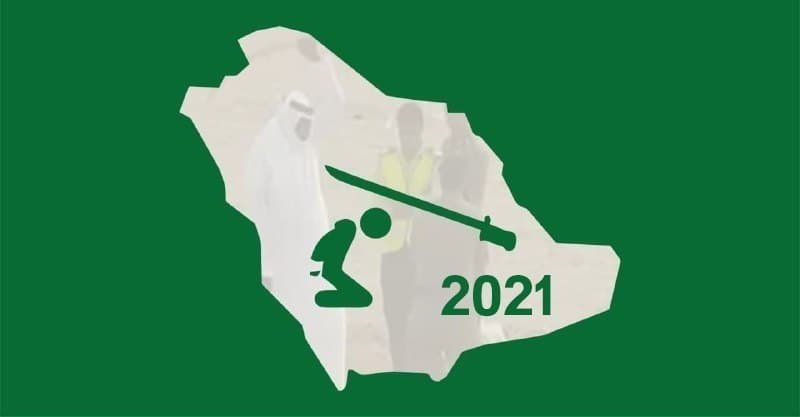
The execution figures announced by Saudi Arabia for the first six months of 2021 have confirmed the falsehood of its claims of reform and reducing executions.
According to the European Saudi Organization for Human Rights (ESOHR), the Saudi government carried out 31 executions in the first half of 2021, exceeding the total number of executions carried out in all 2020, which was 27. The number of executions carried out on the first half of 2021 is double the number of executions carried out in the first half of 2020. ESOHR confirms that the trend in executions in 2021 increases fears that the number of executions that will be carried out by the end of the year will be double the number compared to 2020. The Saudi Human Rights Commission (SHRC) issued a statement in January 2021, praising what it considered a low number of executions during 2020. The Commission stated: “Saudi Arabia radically reduced the number of executions in 2020. The Human Rights Commission has documented only 27 executions in 2020, representing a decrease of 85% from 2019.”
The Head of the Commission, Awwad Alawwad, stated that the reduction is a sign that the Kingdom and its justice system are focusing more on rehabilitation and prevention, rather than solely punishment. Alawwad also stated that that the moratorium on drug-related offences means the Kingdom is giving more non-violent criminals a second chance.
Despite the Commission’s self-congratulatory comments made at the start of the year, the lack of transparency in the Kingdom’s implementation of the death penalty is evident. In their statement, the Commission stated that they had documented 27 executions in 2020. However, as monitored by ESOHR, only 25 executions were published in official statements. ESOHR have been unable to find out information about the two other executions.
Moreover, despite the Commission’s comments on a moratorium for drug related offences, the moratorium has not been legalized and there has not been any legislative amendments to repeal the laws used to sentence individuals to death for drug related offences. Individuals, such as Hussein abo al-Kheir, detained for alleged drug smuggling, remain at risk of imminent execution.
As we pass into the mid-point of 2021, it is clear that the low number of executions carried out 2020 was not a result of reform in the country, rather it was due to the extraordinary conditions that arose from the COVID-19 pandemic. However, Saudi Arabia worked hard to polish its dark image in 2020, particularly considering the Kingdom was due to host the G20 summit in November 2020, which had to be held remotely due to COVID-19.
Additionally, the Commission promoted a Royal Order, issued in April 2020, relating to the moratorium on the death penalty against minors. The Royal Order followed a number of official statements that confirmed that minors will not be executed. Despite their promises and statements, minors remain at risk of execution. On June 15, 2021, Mustafa al-Darwish was executed for crimes allegedly committed when he was a minor. Moreover, at least 4 young men are still at risk of execution for childhood crimes and 5 are at risk of death penalty sentences.
Saudi Arabia has a well-documented track record of broken promises, and so despite their statements, it is clear there has been no real reform on the Kingdom’s application of the death penalty.
ESOHR stresses that the lives of dozens, including at least 4 minors, namely Abdullah al-Howeiti, Sajjad al-Yassin, Jalal al-Labbad and Yusuf al-Mansaf, are at risk of execution. Moreover, five minors—Mohammed al-Faraj, Ahmed al-Faraj, Ali al-Batti, Mohammed al-Nimr and Ali al-Faraj—are at risk of death penalty sentences. Despite the Public Prosecution demanding the highest form of ta’zir punishment in their cases—10 years imprisonment in a juvenile facility—due to the ambiguities in the law on ta’zir and Saudi Arabia’s abysmal track of record of broken promises, these individuals are still at risk of the death penalty.
